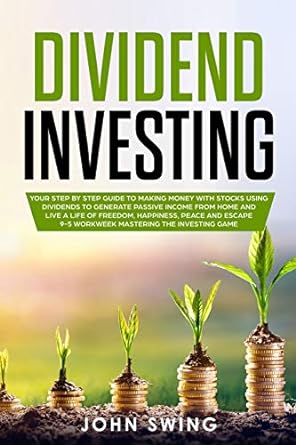Question
a) Shares are an asset that make their buyers part owners of a firm. The TSX Composite Index is a weighted average of the share
a) Shares are an asset that make their buyers part owners of a firm. The TSX Composite Index is a weighted average of the share prices of the largest firms listed on the Toronto Stock Exchange. This index has fallen recently from a peak of 17,874 (Feb 21) to 12,171 (March 19). Use the discussion of share prices in the notes (p. 18) and text to offer reasons for this decline.
(b) How might the Bank of Canadas recent interest rate cuts affect share prices? Explain and be sure to refer to asset pricing equations.
PAGE 18 IS BELOW
Stocks or Shares:
- Common shares give a share of ownership in a business firm.
- Value of a share is linked directly to value of the firm to its owners
i.e., Present Value (PV) of the firms profits
(profits are the stream of income the firm creates for the owners)
- So in equilibrium share prices should reflect PV of firms profits.
- given i: high PV of profits means high price.
- Future profits:
- very uncertain: reflects current best guess.
- changes in stock prices will reflect changes in best guesses.
(this and recent stock market declines: people appear to expect that the covid19 crisis will lower future profits sharply)
- Level of i used to calculate present value also affects share prices.
- higher i, lower is present value of profits, lower share price.
e.g. so rising interest rates will (other things equal) lower
share prices.
- this is a substitutes story: given expected future profits, share prices must fall in order to give a competitive rate of return when i is higher.
(think about this and recent interest rate cuts by central banks: are they trying to raise or stabilize share prices?)
Efficient Markets Hypothesis (EMH)
- Concerned with prices in speculative markets.
- Take stock prices as the example.
- Current price of a stock will reflect all current information on the
firms future profits.
- Changes in the price of the stock will reflect unanticipated, new
information.
- Such future new information is unknown right now.
- So changes in stock prices will be unpredictable.
- Implications:
- stock trading strategies aimed at making money by predicting
price changes will typically not succeed. Price changes are random according to EMH.
- random picks will do as well as expert picks! e,g, Wall St.
Journals dartboard vs, experts competition
- historical data are of no use in predicting stock prices. Only
new information matters!
- success if it occurs reflects:
- luck! - early access to new information (insider!).
- fraud! (Bernie Madoff!)
- Is this too extreme?
- difficult to test: how to measure expectations?
- some evidence seems consistent with efficient markets.
e.g. lack of consistent success of most expert picks.
- some evidence against: small firm effect,volatility,W. Buffett!
- bubbles and busts: new information or irrational behaviour?
- Efficient here refers to efficient use of information in determining prices.
Step by Step Solution
There are 3 Steps involved in it
Step: 1

Get Instant Access to Expert-Tailored Solutions
See step-by-step solutions with expert insights and AI powered tools for academic success
Step: 2

Step: 3

Ace Your Homework with AI
Get the answers you need in no time with our AI-driven, step-by-step assistance
Get Started


